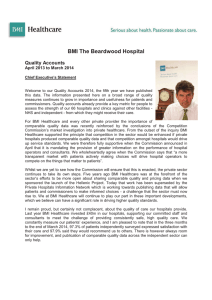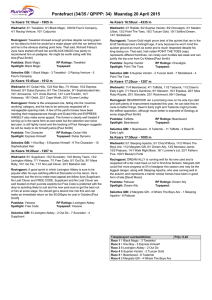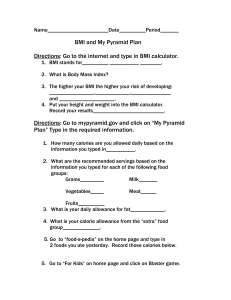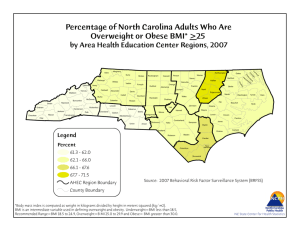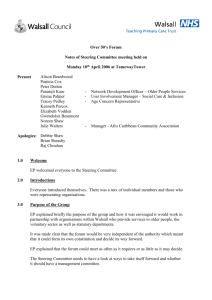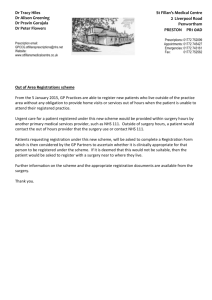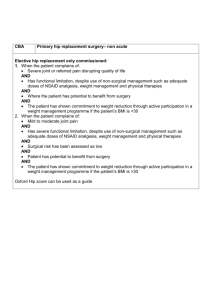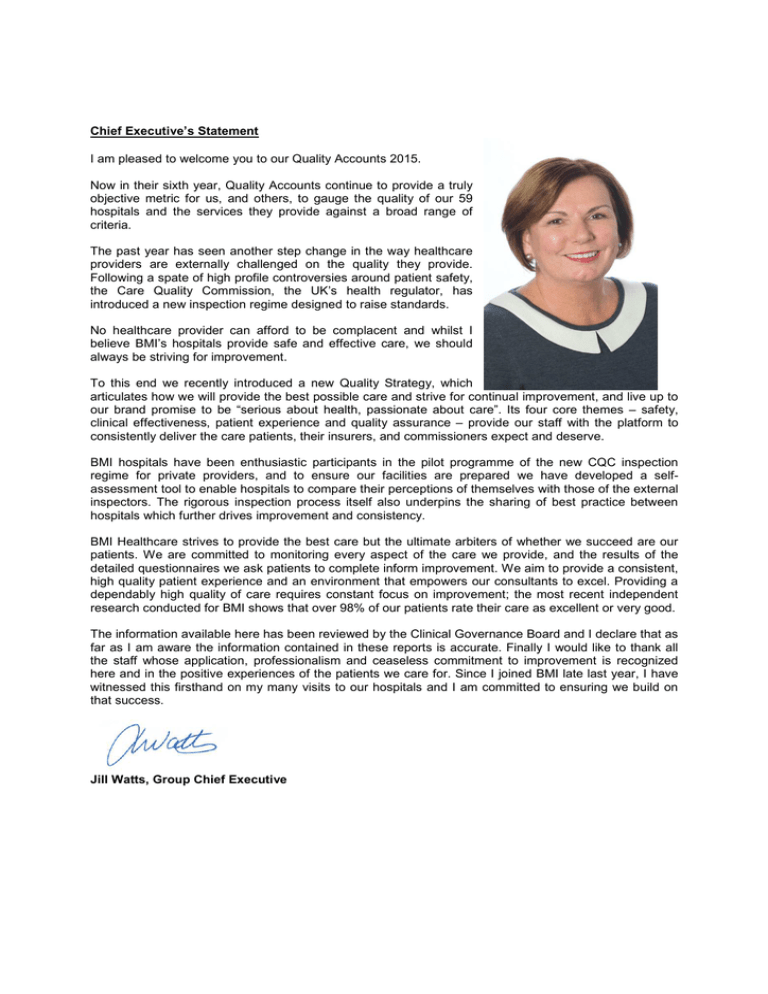
Chief Executive’s Statement
I am pleased to welcome you to our Quality Accounts 2015.
Now in their sixth year, Quality Accounts continue to provide a truly
objective metric for us, and others, to gauge the quality of our 59
hospitals and the services they provide against a broad range of
criteria.
The past year has seen another step change in the way healthcare
providers are externally challenged on the quality they provide.
Following a spate of high profile controversies around patient safety,
the Care Quality Commission, the UK’s health regulator, has
introduced a new inspection regime designed to raise standards.
No healthcare provider can afford to be complacent and whilst I
believe BMI’s hospitals provide safe and effective care, we should
always be striving for improvement.
To this end we recently introduced a new Quality Strategy, which
articulates how we will provide the best possible care and strive for continual improvement, and live up to
our brand promise to be “serious about health, passionate about care”. Its four core themes – safety,
clinical effectiveness, patient experience and quality assurance – provide our staff with the platform to
consistently deliver the care patients, their insurers, and commissioners expect and deserve.
BMI hospitals have been enthusiastic participants in the pilot programme of the new CQC inspection
regime for private providers, and to ensure our facilities are prepared we have developed a selfassessment tool to enable hospitals to compare their perceptions of themselves with those of the external
inspectors. The rigorous inspection process itself also underpins the sharing of best practice between
hospitals which further drives improvement and consistency.
BMI Healthcare strives to provide the best care but the ultimate arbiters of whether we succeed are our
patients. We are committed to monitoring every aspect of the care we provide, and the results of the
detailed questionnaires we ask patients to complete inform improvement. We aim to provide a consistent,
high quality patient experience and an environment that empowers our consultants to excel. Providing a
dependably high quality of care requires constant focus on improvement; the most recent independent
research conducted for BMI shows that over 98% of our patients rate their care as excellent or very good.
The information available here has been reviewed by the Clinical Governance Board and I declare that as
far as I am aware the information contained in these reports is accurate. Finally I would like to thank all
the staff whose application, professionalism and ceaseless commitment to improvement is recognized
here and in the positive experiences of the patients we care for. Since I joined BMI late last year, I have
witnessed this firsthand on my many visits to our hospitals and I am committed to ensuring we build on
that success.
Jill Watts, Group Chief Executive
The Beardwood Hospital
BMI The Beardwood Hospital in Blackburn, Lancashire is part of BMI Healthcare, Britain's
leading provider of independent healthcare with a nationwide network of hospitals & clinics
performing more complex surgery than any other private healthcare provider in the country. Our
commitment is to quality and value, providing facilities for advanced surgical procedures
together with friendly, professional care.
BMI The Beardwood Hospital has 18 single rooms offering the privacy and comfort of en-suite
facilities, satellite TV and telephone. A seven bed day care unit and an augmented care facility,
combined with the latest in technology and support services, enable our consultants to
undertake a wide range of procedures from routine investigations to complex surgery. At The
Beardwood Hospital we have a dedicated Cancer Care Unit treating a wide variety of cancers
including Breast, Bowel, Prostate, Ovarian, Lung, Lymphoma and Myeloma. We also have a
static CT and MR scanning unit offering state of the art facilities. We were the first private unit
to offer both modalities in Lancashire and Cumbria.
This specialist expertise is supported by caring and professional medical staff, with dedicated
nursing teams and Resident Medical Officers on duty 24 hours a day, providing care within a
friendly and comfortable environment.
The amount of NHS work we carry out at the Beardwood Hospital has increased steadily over
the last few years. Our current rate of NHS work amounts to 83%. We accept patients from
the Choose and Book network and are also involved in waiting time initiatives, helping to reduce
waiting times in the NHS by taking blocks of patients on spot contracts.
BMI Healthcare are registered as a provider with the Care Quality Commission (CQC) under the
Health & Social Care Act 2008. BMI The Beardwood Hospital is registered as a location for the
following regulated services:•
•
•
Treatment of disease, disorder and injury
Surgical procedures
Diagnostic and screening
The CQC carried out an unannounced inspection on 5th December 2013 and found that The
Beardwood Hospital was meeting the five standards that were assessed on that day:Care and Welfare of people who use the services
Meeting nutritional needs
Safeguarding people who use the services from abuse
Standards of staffing
Complaints
The hospital has not been subject to any special reviews or investigations.
The Beardwood Hospital has a local framework through which clinical effectiveness, clinical
incidents and clinical quality is monitored and analysed. Where appropriate, action is taken to
continuously improve the quality of care. This is through the work of a multidisciplinary group
and the Medical Advisory Committee.
Regional Clinical Quality Assurance Groups monitor and analyse trends and ensure that the
quality improvements are operationalised. There has been development of our local Clinical
Governance agenda which has been led by our dynamic Governance and Risk Manager. At
The Beardwood Hospital we have held cluster Clinical Risk Summit days which have included
staff from The Beardwood, Gisburne Park and The Lancaster hospitals. These days serve to
educate staff on various topics such as incident reporting, Root Cause Analysis investigations
and Clinical Audit.
At corporate level the Clinical Governance Board has an overview and provides the strategic
leadership for corporate learning and quality improvement.
There has been ongoing focus on robust reporting of all incidents, near misses and outcomes.
Data quality has been improved by ongoing training and database improvements. New reporting
modules have increased the speed at which reports are available and the range of fields for
analysis. This ensures the availability of information for effective clinical governance with
implementation of appropriate actions to prevent recurrences in order to improve quality and
safety for patients, visitors and staff.
At present we provide full, standardised information to the NHS, including coding of procedures,
diagnoses and co-morbidities and PROMs for NHS patients.There are additional external
reporting requirements for CQC, Public Health England (Previously HPA) CCGs and Insurers
BMI is a founding member of the Private Healthcare Information Network (PHIN) UK – where
we produce a data set of all patient episodes approaching HES-equivalency and submit this to
PHIN for publication. The data is made available to common standards for inclusion in
comparative metrics, and is published on the PHIN website http://www.phin.org.uk. This website
gives patients information to help them choose or find out more about an independent hospital
including the ability to search by location and procedure.
1. Safety
1.1 Infection prevention and control
The focus on infection prevention and control continues under the leadership of the Group Head
of Infection Prevention and Control, in liaison with the Lead nurse for Infection Prevention and
Control at The Beardwood Hospital.
We have had: • 0 MRSA bacteraemia cases/100,000 bed days
• 0 MSSA bacteraemia cases /100,000 bed days
• 0 E.coli bacteraemia cases/ 100,000 bed days
• 0 cases of hospital apportioned Clostridium difficile in
the last 12 months.
• SSI data is also collected and submitted to Public Health England for Orthopaedic
surgical procedures. Our rates of infection are;
o Hips 0%
o Knees 0.16%
At The Beardwood Hospital we conduct monthly High Impact Intervention audits on peripheral
intravenous catheters, central venous catheters, hand hygiene and theatre interventions.
The Beardwood Hospital has an extremely dynamic Infection Prevention and Control Lead
nurse who is developing a number of link nurses in all departments so they can assist with the
annual Infection Prevention audit and training program
Environmental cleanliness is also an important factor in infection prevention and our patients
rate the cleanliness of our facilities highly.
Below is a graph to illustrate our cleanliness scores over the year April 2014 to April 2015,
Overall there has been a 2% increase on last year’s scores of 95% to 97%. All the staff are
extremely proud to work at The Beardwood Hospital and this is reflected in an increase in what
was already a very high score.
100
80
60
40
Bathroom Cleanliness
Room Cleanliness
20
0
%
V.Good/Excellent
1.2 Patient Led Assessment of the Care Environment (PLACE)
We believe a patient should be cared for with compassion and dignity in a clean, safe
environment. Where standards fall short, they should be able to draw it to the attention of
managers and hold the service to account. PLACE assessments will provide motivation for
improvement by providing a clear message, directly from patients, about how the environment
or services might be enhanced.
In 2013 we introduced PLACE, which is the new system for assessing the quality of the patient
environment, replacing the old Patient Environment Action Team (PEAT) inspections.
The assessments involve patients and staff who assess the hospital and how the environment
supports patient’s privacy and dignity, food, cleanliness and general building maintenance. It
focuses entirely on the care environment and does not cover clinical care provision or how well
staff are doing their job.
The results will show how hospitals are performing nationally and locally. The results for The
Beardwood Hospital are as follows:-
Site Nam e
Site Type
THE
Acute
BEARDWOO
D HOSPITAL
Cleanliness Food
Overall
99.78%
95.86%
Ward
Food
91.92%
Organisation Privacy,
Food
Dignity
and
Wellbeing
98.74%
Condition
Appearance
and
Maintenance
92.68%
100.00%
These scores have all improved from the previous year, showing how our actions plans, which
have been fully implemented, have worked and improved the patient environment.
1.3 Venous Thrombo-embolism (VTE)
BMI Healthcare, holds VTE Exemplar Centre status by the Department of Health across its
whole network of hospitals including, The Beardwood Hospital. BMI Healthcare was awarded
the Best VTE Education Initiative Award category by Lifeblood in February 2013 and was the
Runner up in the Best VTE Patient Information category.
We see this as an important initiative to further assure patient safety and care. We audit our
compliance with our requirement to VTE risk assess every patient who is admitted to our facility
and the results of our audit on this has shown that over the 12 month period The Beardwood
Hospital has consistently hit 100% compliance
The audit consists of;
Each ward or department admitting patients for day case or in-patient treatments
within a hospital is defined as being a unit, for the purpose of audit.
Each individual unit is required to audit 20 consecutive admissions per quarter.
The elements being audited are :Risk assessment on admission
Risk assessment within 24 hours of admission
Risk assessment after 7 days, or if patient condition changes
The audit is randomised by including a numeric patient identifier only.
Consultant and procedure details can be captured which allows the individual units
and hospitals to identify non-compliance.
The Beardwood Hospital reports the incidence of Venous Thromboembolism (VTE) through the
corporate clinical incident system. It is acknowledged that the challenge is receiving information
for patients who may return to their GPs or other hospitals for diagnosis and/or treatment of VTE
post discharge from the Hospital. As such we may not be made aware of them. We continue to
work with our Consultants and referrers in order to ensure that we have as much data as
possible.
During the 12 month period we are reporting on there have been 0 instances of a VTE at The
Beardwood Hospital
2. Effectiveness
2.1 Patient reported Outcomes (PROMS)
Patient Reported Outcome Measures (PROMs) are a means of collecting information on the
effectiveness of care delivered to NHS patients as perceived by the patients themselves.
PROMs is a Department of Health led programme.
For the current reporting period, the tables below demonstrate that the health gain between
Questionnaire 1 (pre-operative) and Questionnaire 2 (post–operative) for patients undergoing
hip replacement and knee replacement at The Beardwood Hospital.
April 14 – September 14
Oxford Hip Score average
Health gain between reporting
Q1
Q2
periods
The Beardwood Hospital
19.333
40.667
21.333
England
18.16
40.081
21.922
Copyright © 2013, The Health and Social Care Information Centre. All Rights Reserved.
April 14 – September 14
The Beardwood Hospital
England
Oxford Knee Score average
Health gain between reporting
Q1
Q2
periods
N/A
N/A
No score available as less than 30
patients in sample
19.401
36.103
16.702
Copyright © 2013, The Health and Social Care Information Centre. All Rights Reserved.
2.2 Enhanced Recovery Programme (ERP)
The ERP is about improving patient outcomes and speeding up a patient’s recovery after
surgery. ERP focuses on making sure patients are active participants in their own recovery and
always receive evidence based care at the right time. It is often referred to as rapid recovery, is
a new, evidence-based model of care that creates fitter patients who recover faster from major
surgery. It is the modern way for treating patients where day surgery is not appropriate.
ERP is based on the following principles:1. All Patients are on a pathway of care
a. Following best practice models of evidenced based care
b. Reduced length of stay
2. Patient Preparation
a. Pre Admission assessment undertaken
b. Group Education sessions
c. Optimizing the patient prior to admission – i.e HB optimisation, control comorbidities, medication assessment – stopping medication plan.
d. Commencement of discharge planning
3. Proactive patient management
a. Maintaining good pre-operative hydration
b. Minimising the risk of post-operative nausea and vomiting
c. Maintaining normothermia pre and post operatively
d. Early mobilisation
4. Encouraging patients have an active role in their recovery
a. Participate in the decision making process prior to surgery
b. Education of patient and family
c. Setting own goals daily
d. Participate in their discharge planning
BMI The Beardwood Hospital has been represented at the BMI Healthcare ERP conference.
Following this conference a local ERP working party has been formulated to fully implement
best practice model pathways. Areas that are to be focused upon are;
•
Consultant education
•
Pre-operative carbohydrate loading
•
Review of medication used in Spinal Anesthetics’
•
Pre-operative warming of patients
2.3 Unplanned Readmissions within 31 days and unplanned returns to theatre.
Unplanned readmissions and unplanned returns to theatre are normally due to a clinical
complication related to the original surgery. The Beardwood Hospitals figures are detailed below
3. Patient experience
3.1 Patient satisfaction
BMI Healthcare is committed to providing the highest levels of quality of care to all of our
patients. We continually monitor how we are performing by asking patients to complete a patient
satisfaction questionnaire. Patient satisfaction surveys are administered by an independent third
party.
Patient Satisfaction Scores 2013-2014
% scoring Very
Good or Excellent
100
99
98
97
96
95
94
93
92
91
90
Admission
Nursing
Accommodation
Catering
Overall
Admission Nursing
Accom
Catering
Overall
Patient Satisfaction Scores 2014 - 2015
% scoring Very
Good or Excellent
100
99
98
97
96
95
94
93
92
91
90
Admission
Nursing
Accommodation
Catering
Overall
Admission Nursing
Accom
Catering
Overall
3.2 Complaints
In addition to providing all patients with an opportunity to complete a satisfaction survey BMI
The Beardwood Hospital actively encourages feedback both informally and formally. Patients
are supported through a robust complaints procedure, operated over three stages:
Stage 1: Hospital resolution
Stage 2: Corporate resolution
Stage 3: Patients can refer their complaint to independent adjudication if they are not satisfied
with the outcome at the other 2 stages.
At The Beardwood Hospital we continually strive to improve our services and listen to the
feedback we receive from our customers.
4. CQUINS
In 2009 the NHS Commissioning Board introduced the Commissioning for Quality and
Innovation (CQUIN) framework. This was introduced to ensure improvements in the
quality of services and better outcomes for patients.
During 2014 – 2015 BMI The Beardwood Hospital complied with the National CQUINS
program as part of the contractual arrangements with the local Clinical Commissioning
Groups. Data was collected and submitted for VTE Risk Assessment, the Patient Safety
Thermometer and the Friends and Family Test. The monthly audit of VTE assessment
showed excellent compliance at The Beardwood Hospital with 100% being achieved
each month. The Patient Safety Thermometer which looks at the number of falls, and
Health care associated infection relating to urinary catheters similarly showed excellent
results.
In addition to the National CQUIN’s there were also locally agreed CQUIN’s which for
2014-2015 included
1. Early mobilization of patients following Hip or Knee replacement surgery. This
CQUIN combines with our Enhanced Recovery Programme which is an
evidence based programme of care that provides improved outcomes for the
patient. We were required to mobilize all patients who had undergone Hip or
Knee surgery within 24 hours of surgery, research shows that this leads to a
decrease in the number of Deep Vein Thrombosis
2. Establishing mental capacity at Pre-assessment. This CQUIN was aimed at
ensuring the early detection of dementia and subsequent signposting of patients
to the correct services and care.
3. Post Discharge follow-up telephone calls. This measure required us to call
patients 24-48hrs after their discharge from hospital to ensure they were well
and were not experiencing any problems. If patients were found to be having
problems a member of the clinical team would speak with them and try and
resolve any issues.
CQUIN measure
TARGET
Apr14 – Mar15
Friends & Family
30% by Q4
34.47%
Safety
Thermometer
Yes
Yes
100%
100%
90% by Q4
93%
100%
100%
90%
100%
VTE Risk
Assessment
Post Discharge
Follow up calls
Mobilisation of
Patients
following
Hip/knee surgery
Establishing
Mental Capacity
at Pre
Assessment
5. National Clinical Audits
The Beardwood Hospital was only eligible to participate in National Joint Registry audit and all
joint replacements are submitted to this.
6. Research
No NHS patients were recruited to take part in research.
7. Priorities for service development and improvement
•
•
•
•
•
•
The Physiotherapy Department has been relocated to new, larger, fully refurbished
premises. The new facility has given us 5 treatment bays for therapies to take place, a
consulting room and state of the art gym.
The space vacated by moving the physiotherapy department has been fully refurbished
into a minor ops suite. This will primarily be utilized for the Pain management patients to
further improve their journey through the hospital.
Ambulatory care discharge lounge for patients with effect from June 1st
Refurbished staff dining facility
Increased parking with Physiotherapy
I-chemo (electronic prescribing for chemotherapy) live from September 2015
8. Mandatory Quality Indicators
8.1 The value of the summary hospital-level mortality indicator (SHMI) for BMI The Beardwood
Hospital for the reporting period.
Unit
0
Reporting Periods
(at least last two
reporting periods)
Oct 2012 – Jun 2014
National
Average
Highest National
Score
Lowest National
Score
0.9987
1.1849
0.58345
8.2 The Beardwood Hospital patient reported outcome measures scores for
(i) Groin hernia surgery
Unit
0.06
Reporting Periods
(at least last two
reporting periods)
Apr 14 – Sept 14
National
Average
Highest National
Score
Lowest National
Score
0.0786
0.278
-0.112
National
Average
Highest National
Score
Lowest National
Score
-7.395
-1.957
-12.571
National
Average
Highest National
Score
Lowest National
Score
21.542
28.6
9.714
(ii) Varicose vein surgery – unable to report as no data.
Unit
N/A
Reporting Periods
(at least last two
reporting periods)
Apr 14 – Sept 14
(iii) Hip replacement surgery
Unit
21.33
Reporting Periods
(at least last two
reporting periods)
Apr 14 – Sept 14
(iv) Knee replacement surgery during the reporting period – unable to report as numbers too
low to provide accurate data.
Unit
N/A
Reporting Periods
(at least last two
reporting periods)
Apr 14 – Sept 14
National
Average
Highest National
Score
Lowest National
Score
16.641
24.429
5.833
8.3 (i) The percentage of patients aged 0-14 readmitted to a hospital which forms part of the
The Beardwood Hospital within 28 days of being discharged from a hospital which forms part of
the hospital during the reporting period
Unit
N/A
Reporting Periods
(at least last two
reporting periods)
Apr 11 - Mar 12
National
Average
Highest National
Score
Lowest National
Score
11.45
14.35
7.96
The Beardwood Hospital does not admit patients under the age of 18 years for in-patient care.
8.3. (ii) The percentage of patients aged 15 or over readmitted to a hospital which forms part of
The Beardwood Hospital within 28 days of being discharged from a hospital which forms part of
the hospital during the reporting period.
Unit
0.0582%
Reporting Periods
(at least last two
reporting periods)
Apr 11 – Mar 12
National
Average
Highest National
Score
Lowest National
Score
10.01
14.51
5.54
8.4 The Beardwood Hospital’s responsiveness to the personal needs of its patients during the
reporting period.
Unit
96.82%
Reporting Periods
(at least last two
reporting periods)
2013-2014
National
Average
Highest National
Score
Lowest National
Score
68.7
85
54.4
8.5 The percentage of patients who were admitted to The Beardwood Hospital and who were
risk assessed for venous thromboembolism during the reporting period.
Unit
100%
Reporting Periods
(at least last two
reporting periods)
Apr 14 – Jan 15
National
Average
Highest National
Score
Lowest National
Score
95
100
87
8.6 The rate per 100,000 bed days of cases of C difficile infection reported within the The
Beardwood Hospital amongst patients aged 2 or over during the reporting period.
Unit
0
Reporting Periods
(at least last two
reporting periods)
Apr 13 – Mar 14
National
Average
Highest National
Score
Lowest National
Score
14.7
37.1
0
8.7 The number and, where available, rate of patient safety incidents reported within The
Beardwood Hospital during the reporting period, and the number and percentage of such patient
safety incidents that resulted in severe harm or death.
Number of patient safety incidents reported
Unit
160
Reporting Periods
(at least last two
reporting periods)
Oct 13 – Sep 14
National
Average
Highest National
Score
Lowest National
Score
20
139
0
Rate of patient safety incidents reported (Incidents per 100 Bed Days)
Unit
9.3656
Reporting Periods
(at least last two
reporting periods)
Oct 13 – Sep 14
National
Average
Highest National
Score
Lowest National
Score
3.589
7.496
0.0245
Number of patient safety incidents that resulted in severe harm or death
Unit
0
Reporting Periods
(at least last two
reporting periods)
Oct 13 – Sept 14
National
Average
Highest National
Score
Lowest National
Score
40.2
97
0
Percentage of patient safety incidents that resulted in severe harm or death (Incidents per 100
Admissions)
Unit
0%
Reporting Periods
(at least last two
reporting periods)
Oct 13 – Sept 14
National
Average
Highest National
Score
Lowest National
Score
0.3
2.4
0.0
8.8 The percentage of staff employed by The Beardwood Hospital during the reporting period,
who would recommend The Beardwood Hospital as a provider of care to their family or friends.
Unit
94.0%
Reporting Periods
(at least last two
reporting periods)
2014
National
Average
Highest National
Score
Lowest National
Score
64.58
96.43
33.73
9. Non-Mandatory Quality Indicators
9.1 The percentage of patients who received care as inpatients or discharged from A &E during
the reporting period, who would recommend The Beardwood Hospital as a provider of care to
their family or friends.
Unit
99.2%
Reporting Periods
(at least last two
reporting periods)
Jun 13 – Jan 14
National
Average
Highest National
Score
Lowest National
Score
66.23
94.38
35.63

